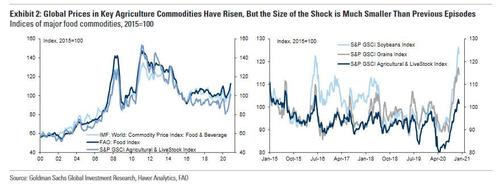In
short, Goldman dismisses the risk of surging food inflation especially
in emerging markets, because "given the limited size of the shock to
date, and with other factors (such as spare capacity) weighing on EM
inflation, the recent rise in agricultural commodity prices
would need to extend quite a bit further for it to have a significant
and lasting effect on inflation and monetary policy across the majority
of EMs."
One wonders if Goldman was just as dismissive
during the food price surge observed in late 2010 that ultimately
culminated in the Arab Spring of early 2011. As the Guardian reminds us:
"A
decade ago this week, a young fruit seller called Mohammed Bouazizi set
himself alight outside the provincial headquarters of his home town in
Tunisia, in protest against local police officials who had seized his
cart and produce.”
It is this backdrop that
brings us a far more concerning note published this morning from
everyone's favorite permabear, SocGen's Albert Edwards, who unlike
Goldman is starting to worry about food inflation. A lot.
As Edwards explains, for much of the past decade he - and other Fed
skeptics - have railed about the distorting impact of QE on asset
prices. And aside from capital markets where the Fed's intervention has
spawned a record wealth divide leading to unprecedented political and
social polarization, perhaps the most disturbing episode of such
distortion was the abovementioned explosion of food prices that began
towards the end of 2010. According to Edwards, many economists - this website included - believe the
Fed’s QE2 was the primary cause for the 2010-11 bubble in food prices
which contributed to the social unrest and ensuing revolutions in many
Arab countries.
This is a problem because in a time when central banks are injecting a record $1.4 billion in liquidity every hour,
and when most economists’ attention is now focused on the impact of the
Fed’s QE on buoyant equity and industrial commodity prices, Albert says
that "we should also watch the unfolding surge in food prices very
closely indeed – and with trepidation."
The
reason for that is again what happened in early 2011 in Tunisia: That
event marked the start of a chain reaction of social unrest around the
Middle East and elsewhere that toppled governments and became known as
the Arab Spring, Edwards writes and adds that "although the narrative of
these revolutions had its origins in longstanding grievances and a
thirst for democracy, many economists identified rocketing global food
prices from the end of 2010 as the trigger. (T’was always so:
certainly, higher food prices contributed to both the French and Russian
revolutions, and to the 1989 unrest in China.)"
As for
whether central banks were responsible for these revolutionary dominoes,
Edwards is a bit more nuanced, writing that while they certainly
spawned much of the asset reflation observed in late 2010, "the
truth is that central banks have no control over which financial bubbles
will ultimately emerge as they spray QE into financial markets." It just so happens that food is one of them with alarming periodicity.
Case in point: bitcoin, which is soaring precisely because institutions have finally realized that central banks injecting 0.66% of GDP into capital markets every month will lift everything, even digital tokens with no intrinsic value. It will certainly lift food prices too.
They go on to show a chart of the start of the Arab Spring and rising food prices. It's a spurious correlation. We double-checked Libya and Syria at the time that bit of misdirection was making the rounds and what was being touted as the cause was actually just blather and possibly cover for the West mucking about in the region.
Didn't check food availability in Egypt or where it all began, Tunisia though. so maybe.
